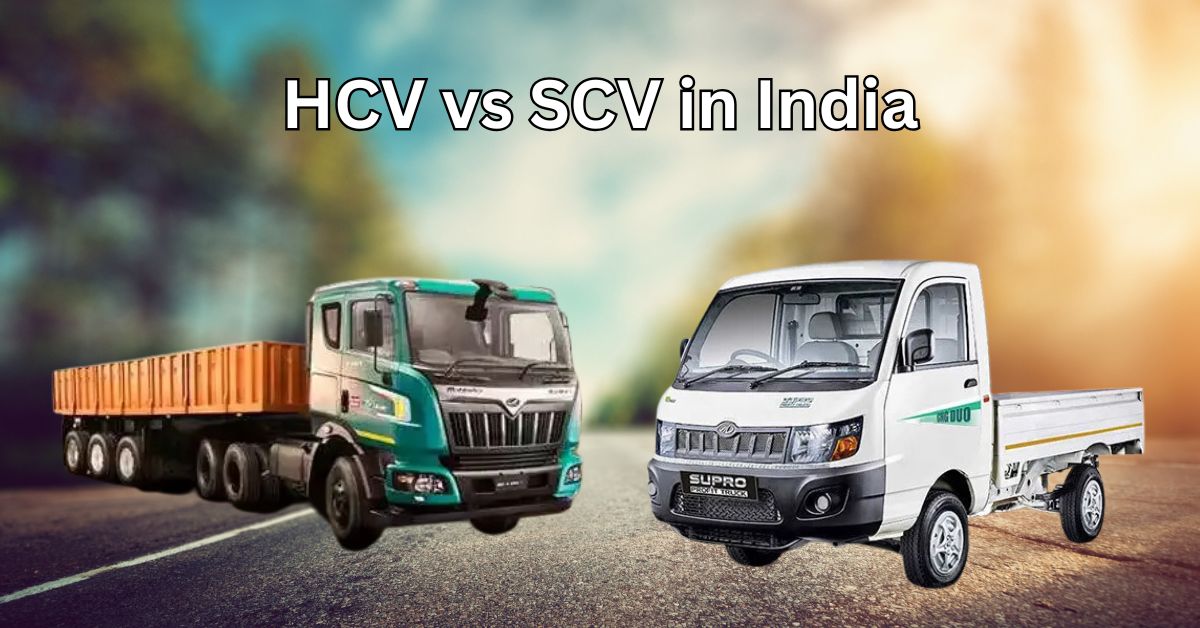The transportation and logistics sectors are growing rapidly in India. It involves moving consignments from one end of the country to the other. Whether you are an emerging entrepreneur or run an extensive business, choosing a proper commercial vehicle is essential for your operations in terms of efficiency, cost, and productivity. Heavy commercial vehicles (HCVs) and small commercial vehicle (SCVs) are two types of transport vehicles, serving their utility in different business situations. Understanding these features will help you serve yourself the best according to your needs.
In this comprehensive guide, let’s contrast HCVs and SCVs in India. We have used our vehicles for certain purposes and can describe some of their benefits. This piece of writing can also help you determine which type might serve better for your business objectives.
Understanding Heavy Commercial Vehicles (HCVs)
Heavy Commercial Vehicle, or HCVs, are heavy trucks used for the long-distance movement of heavy loads. They are utilized in various sectors that demand large logistics, such as construction, mining, and goods transportation. In India, the demand for HCVs like the Mahindra Blazo has been great due to their strength, fuel efficiency, and strong engines, which help them traverse tough terrains and long distances.
Important Features of HCVs
- Higher Load Capacity: HCVs can carry loads that are usually above 7 tons, making them best for transporting bulk goods.
- Rugged Design: HCVs are built to withstand the harshest road conditions and are designed to last.
- Powerful Engines: HCVs have engines engineered to provide heavy-duty performance, which means they can cover a lot of ground.
- Fuel Efficiency in Heavy Loads: Although HCVs consume more fuel than other vehicles, they are designed to provide maximum mileage even under heavy loads.
When to Use an HCV
HCVs come in handy for companies using long hauls to shift plenty of cargo over distance. A lot of companies, ranging from manufacturing to warehouses, rely on HCV to get the job done. A perfect vehicle for dealing with tough roads and shipping your items across states.
Benefits of Using HCV
- Bulk Transportation: Capabilities for moving large shipments eliminate the use of high quantity trips.
- Higher Profit Margins: An HCV is suitable for businesses that carry heavy loads and can take fewer trips and, therefore, more profit.
- Long-Distance Travel: HCVs are designed to travel long distances, making them ideal vehicles for intercity and interstate transportation..
Small Commercial Vehicles (SCVs): A Quick Overview
SCVs, or small commercial vehicle, are fundamentally designed for low-speed ranges and lighter payloads. Small businesses and last-mile delivery companies in both urban and rural regions opt for these vehicles. Models like Mahindra Supro are the best-selling SCVs with compact design, fuel efficiency, and price, perfect for smaller-scale commercial ventures.
Key Features of SCVs
- Compact Size: SCVs are compact in size and easy to maneuver. It is perfect for a crowded urban area.
- Lower Load Capacity: Usually, SCVs can carry 2 tons of load that is appropriate for small businesses.
- Fuel-Efficient Engines: SCVs are highly fuel-efficient and help businesses save a lot on fuel.
- Affordable Maintenance: Due to their simpler mechanics, SCVs need less expensive repairs and are easier to maintain.
When to Choose an SCV
SCVs are excellent for small-scale businesses, especially in retail, agriculture, and logistics industries where last-mile delivery needs to be effective. If your operations are confined to a city or within a limited region, then an SCV is probably the most economical option.
Advantages of Using SCVs:
- Economical for Small Loads: Suitable for businesses carrying lighter loads, saving on operational costs.
- Excellent Agility: Their huge body makes it possible to navigate through thin roads, so they can be used as convenient choices for city deliveries.
- Ideal for Last Mile Delivery: They connect the major centers of distribution and the end consumer. SCVs are very efficient, especially in densely populated urban areas.
- Lower Ownership Expenses: The SCV model has a lower capital cost and lower maintenance expenses, which suits small business entrepreneurs.
HCV vs. SCV: A Detailed Comparison
In determining whether an HCV or SCV is the best, there are so many factors to take into consideration, such as the volume of cargo, the distance that needs to be covered, and the maintenance. Here’s a comparison of the two:
1. Load Capacity
- HCVs: These vehicles have a high load capacity, can carry more than 7 tons of loads, and are best for the construction and manufacturing industries.
- SCVs: They have a low load capacity but can carry up to 2 tons. Their best applications are in retail, food delivery, and small-scale agriculture.
2. Operating Costs
- HCVs: Fuel costs are a little more costly, but they are designed to work harder with heavy loads. As the machinery is more complicated, maintenance costs can be higher.
- SCVs: Overall, these have fewer fuel and maintenance costs. These are suitable for smaller businesses with very tight budgets.
3. Engine Power and Fuel Efficiency
- HCVs: HCVs are characterized by powerful, long-haul engines. Hence, even with loads, they do not consume much more fuel, only a tad higher than SCVs due to power.
- SCVs: SCVs have much smaller engines and, therefore, are high fuel consumers. They are ideal for short distances or light payloads.
4. Maneuverability and Accessibility
- HCVs: Their bodies are bigger and, hence, more difficult to maneuver, especially in urban centers and small lanes.
- SCVs: Suitable for an urban setting for their agility and ability to traverse extremely tight spaces, as well as door-to-door delivery.
5. Purchase Price and Cost Maintenance
- HCVs: High purchase price, higher maintenance, but may have a payback for such in bulk transport.
- SCVs: Lower purchase and maintenance costs make them appropriate for companies that want to reduce expenses but still want an efficient delivery vehicle.
Choose the Right vehicle for your Business
Consider the following points while choosing between an HCV and SCV:
- Type of Goods: HCVs, such as Mahindra Blazo, are best for bulk goods, whereas SCVs, such as Mahindra Supro, are best for light loads.
- Operating Environment: Long-distance interstate travel requires HCVs. However, SCVs are suitable for short distances and within cities.
- Budget: HCVs are costlier to buy and maintain. SCVs are cheaper to buy and maintain.
- Maneuverability Needs: SCVs are ideal for tight spaces and congested areas, whereas HCVs are more suitable for open highways and industrial areas.
Conclusion
Choosing the right commercial vehicle is dependent upon your business requirements, budget, and route requirements. However, whereas an HCV like Mahindra Blazo is used mainly for transporting bulky goods over long distances, an SCV like Mahindra Supro is very suitable for short distances as it offers last-mile delivery. After understanding the characteristics of HCVs and SCVs, you can choose the best vehicle to save and utilize effectively.

